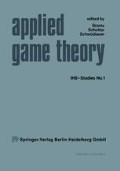Abstract
This paper reports a series of thirty-four experiments that are designed to test the adequacy of several alternative theories of group choice under “majority rule” when no Condorcet point (core) exists. The games we use in these experiments seek, in particular, to establish as much separation as possible between the predictions of several alternative solution concepts and, thereby, to provide a critical test of these competing theories. Briefly, our results strongly support the competitive solution notions for n-person game theory [cf., McKelvey /Ordeshook /Winer], but they provide little if any support for the V-set, the (math) Bargaining Set, Asscher’s [19761 Ordinal Bargaining Set, M°, and several solutions based on vulnerability. The first section of this essay defines and discusses the various solution theories. Section 2 describes our experimental design, and Sections 3 and 4 review the results of these experiments.
This research is supported by an NSF Grant #SOC77-15267 to Carnegie-Mellon University-We also wish to thank Rod Gretlein for technical assistance in computation of the various solutions reported herin and Ed Packel and M. Maschler for comments on an earlier draft.
Access this chapter
Tax calculation will be finalised at checkout
Purchases are for personal use only
Preview
Unable to display preview. Download preview PDF.
References
Asscher, N.: An Ordinal Bargaining Set for Games Without Sidepayments. Mathematics of Operations Research 1 (4), 1976, 381–389.
Aumann, R.J., and M. Maschler: The Bargaining Set for Cooperative Games. Annals of Mathematical Studies 52, 1964, 443–476.
Berl, J., R.D. McKelvey, P.C. Ordeshook, and M. Winer: An Experimental Test of the Core in A Simple TV-Person Cooperative Nonsidepayment Game. Journal of Conflict Resolution 20, 1976, 453–479.
Billera, L.J.: Existence of General Bargaining Sets for Games Without Side Payments. Bulletin of the American Mathematical Society 76, 1970, 375–379.
Ferejohn, J.A., M.P. Fiorina, and E.W. Packel: A Non Equilibrium Approach to Legislative Decision Theory. Social Science Working Paper 202, California Institute of Technology, 1978.
Ferejohn, J.A., M.P. Fiorina, and H.A. Weisburg: Toward a Theory of Legislative Decision. Game Theory and Political Science. Ed. by P.C. Ordeshook. New York 1978.
Fiorina, M., and Ch. Plott: Committee Decisions Under Majority Rule: An Experimental Study. American Political Science Review 72 (2), 1978.
Isaacs, R.M., and Ch. Plott: Cooperative Game Models of the Influence of the Closed Rule in Three Person Majority Rule Committees: Theory and Experiments. Game Theory and Political Science. Ed. by P.C. Ordeshook. New York 1978.
Kramer, G.H.: A Dynamical Model of Political Equilibrium. Cowles Foundation Discussion Paper No. 396, 1975.
Laing, J.D., and S. Olmstead: Policy Making by Committees: An Experimental and Game Theoretic Study. Game Theory and Political Science. Ed. by P.C. Ordeshook. New York 1978.
McKelvey, R.D., and P.C. Ordeshook: Competitive Coalition Theory. Game Theory and Political Science. Ed. by P.C. Ordeshook. New York, forthcoming, 1978a.
McKelvey, R.D., and P.C. Ordeshook: Vote Trading: An Experimental Study. Public Choice, forthcoming, 1978b.
McKelvey, R.D., and P.C. Ordeshook: Some Experimental Evidence for Complex Choice in Cooperative Games with Cores Using Simple Majority Rule, mineo, 1978c.
McKelvey, R.D., P.C. Ordeshook, and M. Winer: The Competitive Solution for TV-Person Games Without Sidepayments. American Political Science Review, June 1978.
Peleg, B.: Bargaining Sets of Cooperative Games Without Side Payments. Israel Journal of Mathematics 1, 1963, 197–200.
Peleg, B.: Existence Theorem for the Bargaining Set (math). Essays in Mathematical Economics in Honor of Oskar Morgenstern. Ed. by M. Shubik. Princeton 1967.
Peleg, B.: The Extended Bargaining Set for Cooperative Games Without Side Payments. Research Program in Game Theory and Mathematical Economics, Department of Mathematics, The Hebrew University of Jerusalem, Israel, Research Memorandum No. 44, March 1969.
Schwartz, Th.: Rationality and the Myth of the Maximum. Nous 6, 1972.
Simpson, P.: On Defining Areas of Voter Choice: Professor Tullock on Stable Voting. Quarterly Journal of Economics 83, 1969.
Author information
Authors and Affiliations
Editor information
Rights and permissions
Copyright information
© 1979 Springer-Verlag Berlin Heidelberg
About this chapter
Cite this chapter
McKelvey, R.D., Ordeshook, P.C. (1979). An Experimental Test of Several Theories of Committee Decision Making Under Majority Rule. In: Brams, S.J., Schotter, A., Schwödiauer, G. (eds) Applied Game Theory. Physica, Heidelberg. https://doi.org/10.1007/978-3-662-41501-6_9
Download citation
DOI: https://doi.org/10.1007/978-3-662-41501-6_9
Publisher Name: Physica, Heidelberg
Print ISBN: 978-3-7908-0208-5
Online ISBN: 978-3-662-41501-6
eBook Packages: Springer Book Archive

